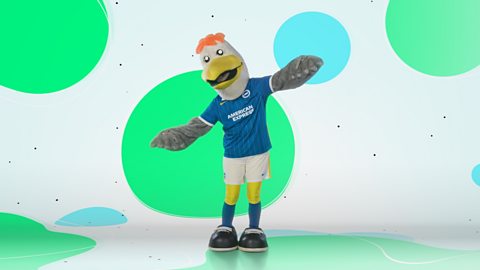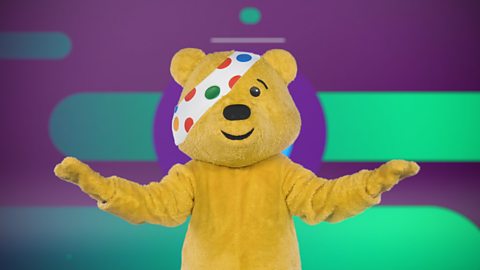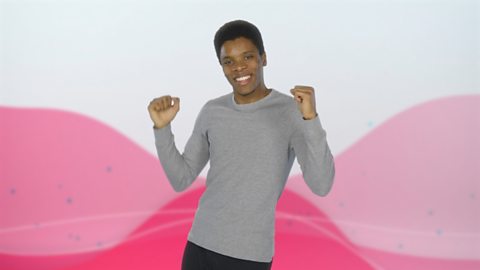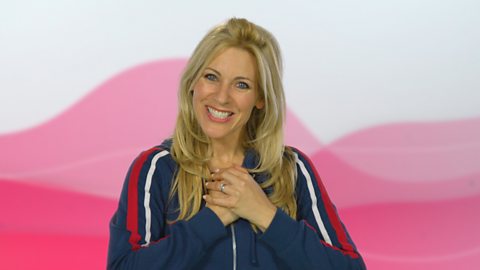Rhys Stephenson:
Hi Super Movers!
When we play, we learn
And when we learn, we play!
LetÔÇÖs find out more!!
Puppies fetch the ball
And kittens play with string
All the time theyÔÇÖre doing this,
TheyÔÇÖre learning brand new things!
They jump around, they do a roll!
They pounce and spring, they dig a hole!
We play to learn. We learn to play
This is what we all do  Its all about fun!
Fun! fun! fun!
We play and learn until the day is done
Throw, catch, think!
Ummm
Play and learn until the day is done
Fun! fun! fun!
We play and learn until the day is done
We play to learn. We learn to play.
This is what we do.
We can play with friends
Or play games on our own.
Word games or number games.
Or new games weÔÇÖve been shown.
Games can help us learn
What new games can we find?
To make our body do new things
Or challenge our great minds
Playing is fun with friends
Take turns and join right in.
Friends we might hold dear to us.
ItÔÇÖs not just loose or win.
Playing games is fun.
Outside or in your head.So leave your serious face at home
Put a smile face on your face instead.
Phew!! So playing games really does help us.
Number games help us count and remember our times tables.
Word games help us write and spell.
And running games make us fit and strong. But that's just the start
What are your favourite games to play? Tell me!!
Oh thatÔÇÖs a good one! Can you think of more?
One more time Super Movers! Here we go!
Its all about
Fun! fun! fun!
We play and learn until the day is done
Throw, catch, think!
Ummm
Play and learn until the day is done
Fun! fun! fun!
We play and learn until the day is done
We play to learn. We learn to play.
This is what we do!
Fun! fun! fun!
We play and learn until the day is done
Throw, catch, think,
Ummm.
Play and learn until the day is done!
Fun! fun! fun!
We play and learn until the day is done
We play to learn. We learn to play
This is what we doIts all about fun.
Rhys Stephenson performs this energetic Super Mood Movers song about learning through play.
Remember, RhysÔÇÖ dance moves can be adapted to suit all children. Your class don't need to be ÔÇÿon-pointÔÇÖ, it's about being physically active, learning and having fun.
After viewing, singing and dancing along, your class could try some of these activities to further explore their learning:
Activities
- Playful pets: Ask pupils to think of animals that play (cats, dogs, skipping lambs, horses galloping, ducklings following each other, squirrels chasing each other, budgies playing with a shiny mirror, hamsters on a wheel). Invite the children to draw an animal playing and to add a caption using this outline: 'A _____ learns to _____ by ______ .' For example, 'A kitten learns to hunt by chasing leaves.'
- What can our games teach us?: Ask children to list things they have learned from a game. Prompt them with: 'What could you learn from throwing a ball through a basketball hoop or from a coconut shy at the fair?' (to get better at aiming). After pupils have shared their thoughts, sum up with: 'Playing helps us try out ideas and learn new skills. When we play, we learn.'
- How do you play ?: Invite pupils to take turns to describe how to play a game, without naming it. Their classmates have to guess what game they mean and say what the game can teach us. You could begin: 'One player counts to 100 while the others look for a place where the first player won't find them.' (Hide And Seek. The game gives us counting practice and helps us think of the world from someone else's point of view.) You could prompt pupils by whispering some of these suggestions: tag, I-spy, follow-my-leader, musical statues, snakes and ladders, marbles.
- Number games: Children could try some different number games, such as dominoes (counting and number matching) or snakes and ladders (counting, addition and subtraction). They could make bingo cards to practise number bonds or times table answers (a bingo card might contain items such as 3-2 or 2x6). Children could take turns to be the bingo caller, pulling a number card from a lucky dip.
- Measuring games: Ask the children to think of sports or games that use measurements. They might suggest: long jump or high jump (measuring length and height) or races that are timed with a stopwatch, for instance. They could give some of these a try.
- Memory game: Place ten small objects on a tray (a pen, a key, etc.) and ask the class to memorise what is there. Cover the tray with a cloth and sneakily remove an item. Children could take turns to name the missing item. To keep the game fresh, add more items between turns, or re-arrange the things on the tray. Ask: 'How does this game helps us learn?' and gather pupils' responses.
- Word games: Give children some word games to explore: word searches, simple crosswords, or scrambled up spellings that have to be untangled (yednok  donkey). Children could try some vocabulary games ('I went to the shop and I bought an apple, a banana, a cake') or a game where they mime an action to illustrate different adverbs ('Can you stir the soup angrily? Lazily? Hopefully? Hungrily?').
- Tongue twisters: Tongue twisters are a great way to improve concentration, pronunciation and verbal dexterity. Maybe try: 'She sells seashells by the sea shore'. The children may enjoy making up their own tongue twisters using words that rhyme or begin with the same letter.
- Pretending games: The children could help you set up a corner of the classroom for imaginary play, with dressing-up clothes and props on a particular theme: a workplace perhaps, such as a cafe or office, or a setting from a story.
- Class reflection: With all these games, encourage the children to reflect afterwards, by asking: 'What can we learn from playing?' Gather the children's responses to establish that as well as helping us with things like word or number knowledge, playing helps us to make friends by taking turns and joining in and to practise until we get really good at something. Games where we pretend help us grow our imaginations and dream new things. Conclude with, 'Playing helps us to try again and have another go and not to take things too seriously. Playing helps us relax and enjoy life. What will you play today?'
Learning aims or objectives
The Super Mood Movers song Ways To Learn And Play and these activity notes address the following learning objectives from the curriculum guidance of the four UK nations.
England, PHSE
From the PSHE Association programme of study:
- Health and Wellbeing:
- H9. about different ways to learn and play.
- H17. about things that help people feel good (e.g. playing outside, doing things they enjoy).
- Relationships:
- R24. how to listen to other people and play and work cooperatively.
Northern Ireland, PD&MU
From the Northern Ireland curriculum for Personal Development and Mutual Understanding:
Foundation and Key Stage 1
- Theme 1, Self-awareness (Strand 1):
- Themselves and their personal attributes: Explore who they are. Recognise what they can do. Identify their favourite things. Recognise what makes them special.
- Theme 3: Learning to Learn (Strand 1):
- Learn to focus attention, concentrate and remember by taking part in a variety of activities that reflect the way they learn.
- Be encouraged to develop a positive attitude to learning.
- Positive attitudes to learning and achievement: Become aware of their own strengths, abilities, qualities, achievements, personal preferences and goals.
- Acknowledge that everyone makes mistakes: that attempts can fail or have disappointing outcomes but that this is a natural and helpful part of learning.
- Recognise how they can develop and improve their learning.
Scotland, PSE
From the Education Scotland Personal and Social Education benchmarks:
- Early level health and wellbeing:
- Planning for choices and changes: Expectations and Aspirations; Relevance of learning to future choices: Talks about own learning, strengths, skills and next steps. (HWB 0-20a/HWB 1-20a).
From the Curriculum for Excellence Health and Wellbeing Experiences and Outcomes:
- Health and wellbeing, Social wellbeing: I can make full use of and value the opportunities I am given to improve and manage my learning and, in turn, I can help to encourage learning and confidence in others, (HWB 0-11a / HWB 1-11a).
- Planning for choices and changes: everyday activity and play, I can explore and make choices to develop my learning and interests. I am encouraged to use and share my experiences, (HWB 0-19a).
- Through taking part in a variety of events and activities, I am learning to recognise my own skills and abilities as well as those of others, (HWB 1-19a).
- Physical eduction: I am developing my movement skills through practice and energetic play, (HWB 0-22a).
- I am developing skills and techniques and improving my level of performance and fitness, (HWB 1-22a).
- Cooperation and competition: I am aware of my own and othersÔÇÖ needs and feelings especially when taking turns and sharing resources. I recognise the need to follow rules, (HWB 0-23a).
- I can follow and understand rules and procedures, developing my ability to achieve personal goals. I recognise and can adopt different roles in a range of practical activities, (HWB 1-23a).
Wales, PSE
From the Personal and Social Education Framework for 7 to 19-year-olds in Wales:
- Health and emotional wellbeing: take increasing responsibility for keeping the mind and body safe and healthy.
- Preparing for lifelong learning: enjoy and value learning and achievements; take increasing responsibility for their learning.
- Improving own learning: experience various learning styles and recognise the ways in which they learn best.
- Reflect on progress: apply learning to similar situations within school; develop practical skills necessary for everyday life.

More from Super Mood Movers:
Fit and well. video
Brighton & Hove Albion mascot Gully the Seagull performs this upbeat Super Mood Movers song about the importance of staying fit and well.

Taking care of our world. video
Pudsey and Karim Zeroual perform this larger-than-life Super Mood Movers song about the importance of taking care of the world around us.

Friends and family. video
Pudsey performs this toe-tapping Super Mood Movers song which offers a huge 'big up' to our friends and family.

Coping with feelings. video
Rhys Stephenson performs this touching Super Mood Movers song about different feelings.

Being happy and safe. video
Naomi Wilkinson performs this uplifting Super Mood Movers song about being happy and staying safe.
